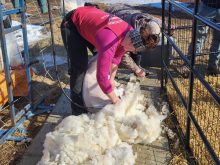INVERURIE, U.K. – Wednesday, March 20, 1996 is a day that lives in infamy for Brian Pack.
On that day, Tory health minister Steven Dorrel admitted in the House of Commons there was a risk to humans who ate beef infected with bovine spongiform encephalopathy.
As chief executive officer of the largest auction and abattoir chain in Europe, Pack watched helplessly as panic swept across the British Isles.
Within 48 hours, beef exports were banned worldwide and beef markets tumbled.
That first week, the ANM Group lost £500,000.
Read Also

Charges laid after cattle theft
Saskatchewan RCMP lay two charges against a man after six cattle went missing.
“Some of our lorries (trucks hauling beef) were never even unloaded. We had to go and pick them up again and bring them back, at our expense,” said Pack.
They killed nothing for three weeks and finally reduced the price of beef below cost to convince people to buy.
Beef prices in stores dropped from about £2.40 per kg to £1.80 per kg. Live cattle prices dropped about 20 percent.
Based outside of Aberdeen at Inverurie, the ANM Group is a farmer owned co-operative with about 7,500 members. It owns a chain of auction marts and several abattoirs handling about 100,000 head of cattle and 600,000 sheep per year.
Prior to 1996, it had 500 employees. The BSE crisis forced the company to lay off 240. Two abattoirs closed in 1996.
“It’s been a dramatic period of change for us,” said Pack.
The company has a full labor force again but the staff handles different jobs because new laws demand complete animal traceback.
A new computer system was installed to keep records and cross reference the paperwork from buyer to seller.
The auction cannot accept any animal without two eartags and a completed passport.
If a tag is missing, the farmer must replace it because the auction will not carry that expense.
There is a £50 fee for lost passports, which the farmer pays.
A second scheme prohibits any animal over the age of 30 months from entering the food chain.
Thousands of tonnes of meat were destroyed in 1996 because it came from animals older than 30 months.
“Everybody thinks the 30 month scheme is about cows but some of our best beef came from steers who were 33-34 months when they were slaughtered,” said Pack.
About 70 percent of their trade was bone-in product, large cuts and sides. Now it is all boneless, boxed beef and it is all consumed domestically.
The byproducts that once earned money for ANM members became added expenses.
It costs £85 per tonne to get rid of bones at the company’s abattoirs. Members used to earn £40 per tonne.
The tallow market is also gone.
Pack said complete traceability is good.
“The drive is in the right direction. If you’re going to have traceability, you just have to do it. Folk get used to it.”
But the company is still getting used to the loss of export markets.
Prior to 1996, Britain exported about 25 percent of its beef. For ANM, Italy was a primary customer.
The Italians wanted big Charolais, Simmental and Limousin steers finished on grass to about 800 kg liveweight, said John Gregor, general manager for ANM.
“They wanted the whole carcass, bone in. That was a big trade in bone-in export trade,” said Gregor.
“The combination of the 30 month rule and the lack of an export market halved the market,” he said.
Now all domestically produced beef stays home and supply is supplemented with imports from the European continent and Argentina.
“All the cow meat has been replaced with steer meat,” said Gregor.
“It was a large part of our trade. At one time we sold 500 cull cows a week here and we lost that business overnight,” said Eddie Gillander, marketing director.
Gregor said the new laws are not a waste of prime livestock.
“We’re dealing with a public health issue and it’s in a different league isn’t it?”
To make up for lost livestock revenue ANM has diversified by selling autos and all species of livestock. It also offers a Sunday farmer’s market.

















